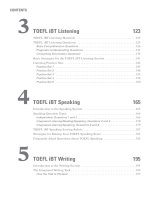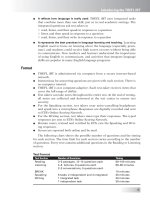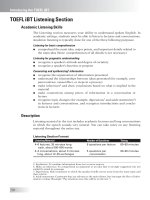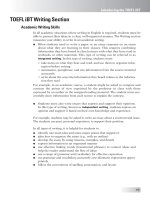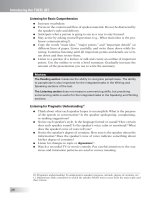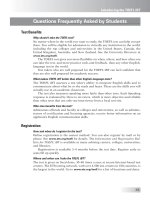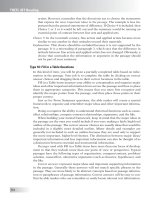The official guide to the toefl ibt third edition part 65 pptx
Bạn đang xem bản rút gọn của tài liệu. Xem và tải ngay bản đầy đủ của tài liệu tại đây (73.8 KB, 7 trang )
b
Study roots, prefixes, and suffixes; study word families.
b
Use available vocabulary resources, such as a good thesaurus or a
dictionary of collocations (words commonly used together)
Level: LOW (0–14)
Test takers who receive a score at the LOW level, as you did, typically understand
some of the information presented in academic texts in English that require a
wide range of reading abilities, but their understanding is limited.
YOUR PERFORMANCE
Test takers who receive a score at the LOW level typically:
b
have a command of basic academic vocabulary, but their understanding
of less common vocabulary is inconsistent;
b
have limited ability to understand and connect information, have
difficulty recognizing paraphrases of text information, and often rely
on particular words and phrases rather than a complete understanding
of the text;
b
have difficulty identifying the author’s purpose, except when that
purpose is explicitly stated in the text or easy to infer from the text; and
b
can sometimes recognize major ideas from a text when the information
is clearly presented, memorable or illustrated by examples, but have
difficulty doing so when the text is more demanding.
ADVICE FOR IMPROVEMENT
Read as much and as often as possible. Develop a system for recording unfamil-
iar words.
b
Group words into lists according to topic or meaning and review and
study the words on a regular basis so that you remember them.
b
Increase your vocabulary by analyzing word parts; study roots, prefixes,
and
suffixes; study word families. Study the organization of academic
texts and overall structure of a reading passage. Read an entire passage
from beginning to end.
b
Look at connections between sentences; look at how the end of one
sentence relates to the beginning of the next sentence.
b
Look for the main ideas and supporting details and pay attention to the
relationship between them.
b
Outline a text to test your understanding of the structure of a reading
passage.
b
Begin by grouping paragraphs that address the same concept.
b
Write one sentence summarizing the paragraphs that discuss the same
idea.
b
Write a summary of the entire passage.
439
Appendix 2
Listening Skills
Level: HIGH (22–30)
Test takers who receive a score at the HIGH level, as you did, typically understand
conversations and lectures in English that present a wide range of listening
demands. These demands can include difficult vocabulary (uncommon terms, or
colloquial or figurative language), complex grammatical structures, abstract or
complex ideas and/or making sense of unexpected or seemingly contradictory
information.
YOUR PERFORMANCE
When listening to lectures and conversations like these, test takers at the HIGH
level typically can:
b
understand main ideas and important details, whether they are stated or
implied;
b
distinguish more important ideas from less important ones;
b
understand how information is being used (for example, to provide
evidence for a claim or describe a step in a complex process);
b
recognize how pieces of information are connected (for example, in a
cause-and-effect relationship);
b
understand many different ways that speakers use language for purposes
other than to give information (for example, to emphasize a point,
express agreement or disagreement, or convey intentions indirectly); and
b
synthesize information, even when it is not presented in sequence, and
make correct inferences on the basis of that information.
ADVICE FOR IMPROVEMENT
Further develop your listening ability with daily practice in listening in English
and by challenging yourself with increasingly lengthy listening selections and
more complex listening material.
b
Listen to different kinds of materials on a variety of topics:
t
Focus on topics that are new to you.
t
Listen to academic lectures and public talks.
t
Listen to audio and video material on TV, radio and the Internet.
t
Listen to programs with academic content, such as NOVA, BBC and
NPR broadcasts.
t
Listen to conversations, phone calls and phone recordings.
t
Take live and audio-recorded tours (e.g., of museums).
b
Listen actively:
t
Take notes as you listen for main ideas and important details.
t
Make predictions about what you will hear next.
t
Summarize.
t
Write down new words and expressions.
440
Appendix 2
b
For the more difficult material you have chosen to listen to, listen several
times:
1. First listen for the main ideas and key details;
2. Then listen again to fill in gaps in your understanding; to understand
the connections between ideas, the structure of the talk and the
speakers’ attitude; and to distinguish fact from opinion.
Level: INTERMEDIATE (14–21)
Test takers who receive a score at the INTERMEDIATE level, as you did, typically
understand conversations and lectures in English that present a wide range of lis-
tening demands. These demands can include difficult vocabulary (uncommon
terms or colloquial or figurative language), complex grammatical structures and/
or abstract or complex ideas. However, lectures and conversations that require
the listener to make sense of unexpected or seemingly contradictory information
may present some difficulty.
YOUR PERFORMANCE
When listening to conversations and lectures like these, test takers at the INTER-
MEDIATE level typically can:
b
understand explicitly stated main ideas and important details, especially
if they are reinforced, but may have difficulty understanding main ideas
that must be inferred or important details that are not reinforced;
b
understand how information is being used (for example, to provide
support or describe a step in a complex process);
b
recognize how pieces of information are connected (for example, in a
cause-and-effect relationship);
b
understand, though perhaps not consistently, ways that speakers use
language for purposes other than to give information (for example, to
emphasize a point, express agreement or disagreement, or convey
intentions indirectly); and
b
synthesize information from adjacent parts of a lecture or conversation
and make correct inferences on the basis of that information, but may
have difficulty synthesizing information from separate parts of a lecture
or conversation.
ADVICE FOR IMPROVEMENT
Practice listening in English daily. Gradually increase the amount of time that
you spend listening, the length of the listening selections and the difficulty of the
material.
b
Listen to different kinds of materials on a variety of topics:
t
Start with familiar topics; then move to topics that are new to you.
t
Listen to audio and video material on tape/DVD or recorded from TV,
radio and the Internet.
441
Appendix 2
t
Listen to programs with academic content, such as NOVA, BBC and
NPR broadcasts.
t
Listen to conversations and phone recordings.
b
Listen actively:
t
Take notes as you listen for main ideas and important details.
t
Ask yourself about basic information (Who? What? When? Where?
Why? How?).
t
Make predictions about what you will hear next.
t
Summarize.
t
Write down new words and expressions.
b
For more difficult material, listen several times:
1. First listen with English subtitles, if they are available;
2. Then, without subtitles, listen for the main ideas and key details;
3. Then listen again to fill in gaps in your basic understanding and to
understand the connections
Level: LOW (0–13)
YOUR PERFORMANCE
Test takers who receive a score at the LOW level, as you did, typically understand
the main idea and some important details of conversations. However, test takers
at the low level may have difficulty understanding lectures and conversations in
English that involve abstract or complex ideas and recognizing the relationship
between those ideas. Test takers at this level also may not understand sections of
lectures and conversations that contain difficult vocabulary or complex gram-
matical structures.
ADVICE FOR IMPROVEMENT
Test takers at the LOW level typically can:
b
understand main ideas when they are stated explicitly or marked as
important, but may have difficulty understanding main ideas if they
are not stated explicitly;
b
understand important details when they are stated explicitly or marked
as important, but may have difficulty understanding details if they are
not repeated or clearly marked as important, or if they are conveyed over
several exchanges among different speakers;
b
understand ways that speakers use language to emphasize a point or
to indicate agreement or disagreement, but generally only when the
information is related to a central theme or is clearly marked as
important; and
b
make connections between the key ideas in a conversation, particularly
if the ideas are related to a central theme or are repeated.
442
Appendix 2
ADVICE FOR IMPROVEMENT
Practice listening in English daily. Gradually increase the amount of time that
you spend listening, as well as the length of the individual listening selections.
b
Listen to different kinds of materials on a variety of topics:
t
Listen to recordings on topics that are familiar to you.
t
Listen to recordings of English lessons.
t
Listen to audio and video material on tape/DVD or recorded from TV.
t
Listen to short programs with some academic content.
t
Listen to conversations.
b
Listen actively:
t
Take notes as you listen for main ideas and important details.
t
Ask yourself about basic information (Who? What? When? Where?
Why? How?).
t
Make predictions about what you will hear next.
t
Summarize.
t
Write down new words and expressions.
b
Listen several times to each recording:
1. First listen with English subtitles, if they are available;
2. Then, without subtitles, listen for the main ideas and key details;
3. Then listen again to fill in gaps in your basic understanding and to
understand the connections between ideas.
443
Appendix 2
Speaking Skills: Speaking About Familiar Topics
Level: GOOD (3.5–4.0)
YOUR PERFORMANCE
Your responses indicate an ability to communicate your personal experiences and
opinions effectively in English. Overall, your speech is clear and fluent. Your use
of vocabulary and grammar is effective with only minor errors. Your ideas are
generally well developed and expressed coherently.
ADVICE FOR IMPROVEMENT
Look for opportunities to speak to native speakers of English. Interaction with
others will improve your speaking ability.
b
Ask a native speaker to provide feedback on your pronunciation
problems (if any).
b
Join an Internet voice chat.
Level: FAIR (2.5–3.0)
YOUR PERFORMANCE
Your responses indicate you are able to speak in English about your personal
experiences and opinions in a mostly clear and coherent manner. Your speech is
mostly clear with only occasional errors. Grammar and vocabulary are somewhat
limited and include some errors. At times, the limitations prevent you from elab-
orating fully on your ideas, but they do not seriously interfere with overall com-
munication.
ADVICE FOR IMPROVEMENT
Think about topics related to student life (what type of classes you enjoy taking,
what is the best place to study, where you would prefer to live [on or off cam-
pus]).
b
Write down two reasons to explain your preference; practice speaking for
one minute about each topic, using connecting words or phrases to help
explain your opinion (“the reason I prefer,” “this is important to me
because”).
b
Practice speaking for a limited time on different topics without a lot of
preparation. Make a list of some general speaking topics (people you
admire, places you enjoy visiting, things you enjoy doing).
b
Then think of a specific example for each topic (a parent, the market,
reading books).
b
Talk about each one for one minute, explaining what you admire or
enjoy about each.
b
Repeat your responses to each topic two or three times to build up
fluency.
444
Appendix 2
Level: LIMITED (1.5–2.0)
YOUR PERFORMANCE
Your responses indicate some difficulty speaking in English about everyday expe-
riences and opinions. Listeners sometimes have trouble understanding you
because of noticeable problems with pronunciation, grammar and vocabulary.
While you are able to respond partially to the questions, you are not able to fully
develop your ideas, possibly due to limited vocabulary and grammar.
ADVICE FOR IMPROVEMENT
Give yourself about 20 seconds to think about what you did yesterday. After 20
seconds, begin to recount what you did. Try to talk for one minute.
b
Pay attention to your use of the past tense.
b
Try to use connecting words and phrases, such as “first,” “then,” “while I
was.”
Give yourself about 20 seconds to think about what you will probably do tomor-
row. Try to talk for one minute. After 20 seconds, begin to talk about what you are
planning to do.
Level: WEAK (0–1.0)
YOUR PERFORMANCE
Your responses are incomplete. They contain little or no content and are difficult
for listeners to understand.
ADVICE FOR IMPROVEMENT
Practice speaking about different topics without a lot of preparation. Write down
several questions about various topics (for example, about your family, your hob-
bies, your friends or your school). Select a question and answer it aloud. Think of
a story that you are familiar with. Tell the story to several different people. Try to
tell the story faster each time.
445
Appendix 2

